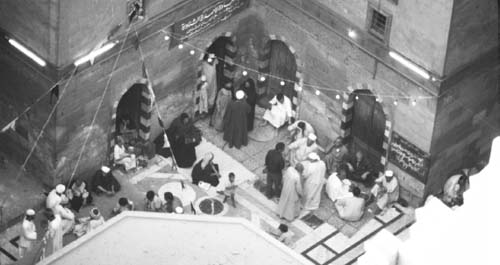IslamLeadership, Authority, and Religious Roles |
What is a Sufi? |
The word Sufi seems to derive from the Arabic word for “wool” (suf, pronounced soof). Among the first generations of Muslims Sufis were ascetics, spiritual athletes who strove to detach themselves from whatever distracted them from worshipping God. Garments of rough wool symbolized their desire for a simple life. Some of these early ascetics gained a reputation, often much to their personal consternation, for holiness. But some early seekers of deeper spirituality found ascetical discipline and self-denial an unsatisfactory path. A woman of Baghdad named Rabi’a (d. 801, pronounced RAAbi’ah) gave expression to a fierce longing for God in bold, shocking love poetry. How dare a mere mortal talk of a loving relationship with the infinite God! Rabi’a was the first true mystic, an inspiration to many who would risk all to communicate the unspeakable. Some, like Hallaj (d. 922), would die for their presumptuousness, accused of blasphemy and fatally misinterpreted, thus sharing the fate of mystics in many traditions. People everywhere sought out these spiritual beacons for guidance and blessing. Communities gathered around some prominent Sufis and eventually developed into formal organizations called Tariqas (pronounced taREEkah, meaning “path”).
Over the centuries dozens of major Sufi men and women have left a legacy of poetry, arresting insight, and leadership. Jalal ad-Din Rumi (d. 1273), the original “whirling dervish,” is one of the more famous classical Sufis, translations of his poetry now ranking among the best sellers in the United States. In some parts of the world, such as the Central Asian republics that made up the southern tier of the former Soviet Union, Sufi orders have been responsible in large part for the very survival of Islam through very difficult times. Many international Sufi organizations now maintain Web sites. Some teach that one does not need to be a Muslim to be a Sufi, but it is nevertheless important to keep in mind that Sufism is a genuinely Islamic phenomenon.

A gathering of Sufis and their families in a fourteenth century madrasa (theological college) during a religious festival in Cairo, Egypt.
